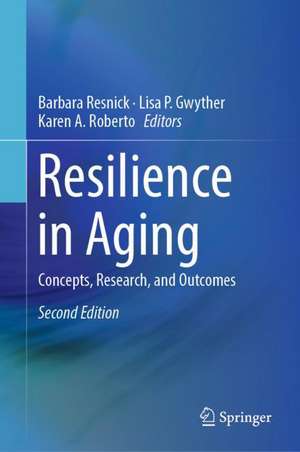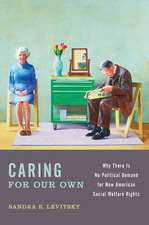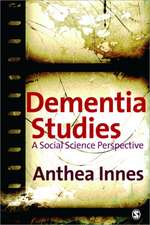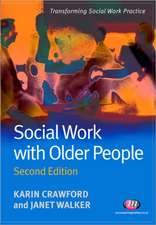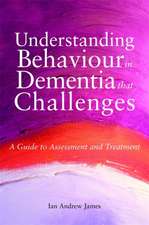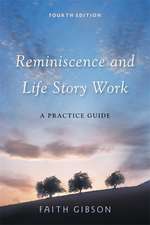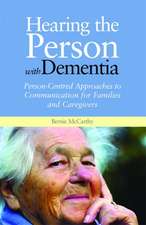Resilience in Aging: Concepts, Research, and Outcomes
Editat de Barbara Resnick, Lisa P. Gwyther, Karen A. Robertoen Limba Engleză Hardback – 10 ian 2019
The book’s coverage extends across disciplines and domains, including:
- Resilience and personality disorders in older age.
- Cultural and ethnic perspectives on enhancing resilience in aging
- Sustained by the sacred: religious and spiritual factors for resilience in adulthood and aging.
- Building resilience in persons with early-stage dementia and their care partners.
- Interdisciplinary geriatric mental health resilience interventions.
- Developing resilience in the aged and dementia care workforce.
- Using technology to enhance resilience among older adults.
| Toate formatele și edițiile | Preț | Express |
|---|---|---|
| Paperback (1) | 1099.20 lei 6-8 săpt. | |
| Springer – sep 2014 | 1099.20 lei 6-8 săpt. | |
| Hardback (2) | 1106.33 lei 6-8 săpt. | |
| Springer – 27 oct 2010 | 1106.33 lei 6-8 săpt. | |
| Springer International Publishing – 10 ian 2019 | 1109.08 lei 6-8 săpt. |
Preț: 1109.08 lei
Preț vechi: 1167.45 lei
-5% Nou
Puncte Express: 1664
Preț estimativ în valută:
212.22€ • 222.17$ • 175.60£
212.22€ • 222.17$ • 175.60£
Carte tipărită la comandă
Livrare economică 05-19 aprilie
Preluare comenzi: 021 569.72.76
Specificații
ISBN-13: 9783030045548
ISBN-10: 3030045544
Pagini: 702
Ilustrații: XIII, 420 p. 12 illus., 4 illus. in color.
Dimensiuni: 155 x 235 mm
Greutate: 0.79 kg
Ediția:2nd ed. 2018
Editura: Springer International Publishing
Colecția Springer
Locul publicării:Cham, Switzerland
ISBN-10: 3030045544
Pagini: 702
Ilustrații: XIII, 420 p. 12 illus., 4 illus. in color.
Dimensiuni: 155 x 235 mm
Greutate: 0.79 kg
Ediția:2nd ed. 2018
Editura: Springer International Publishing
Colecția Springer
Locul publicării:Cham, Switzerland
Cuprins
Chapter 1: Definition of Resilience.- Chapter 2: Successful Aging and Resilience: Applications for Public Health, Healthcare, and Policy.- Chapter 3: Resilience and Personality Disorders in Older Age.- Chapter 4: What Do We Know About Resilience in Older Adults? An Exploration of Some Facts, Factors, and Facets.- Chapter 5: Psychological Resilience.- Chapter 6: Physiological resilience and the Impact on Health.- Chapter 7: How the Arts and Humanities Can Help Older Persons with Dementia and Their Caregivers Be More Resilient.- Chapter 8: Cultural and Ethnic Perspectives on Enhancing Resilience in Aging.- Chapter 9: Volunteering in Later Life: Policies and Programs to Support a Resilient Aging Society.- Chapter 10: Sustained by the Sacred: Religious and Spiritual Factors for Resilience in Adulthood and Aging.- Chapter 11: Overcoming Stressful Experiences in Older Age.- Chapter 12: The Relationship Between Resilience and Motivation.- Chapter 13: Fostering Resilience in Dementia through Narratives: Contribution of Multimedia Technologies.- Chapter 14: Building Resilience in Persons with Early-Stage Dementia and Their Care Partners.- Chapter 15: Resilience and Faith for African American Caregivers.- Chapter 16: Promoting Resilience through Aging-Friendly Community Initiatives: Opportunities and Challenges.- Chapter 17: Promoting Resilience in Small-Scale, Homelike Residential Care Settings for Older People with Dementia: Experiences from the Netherlands and the United States.- Chapter 18: Interdisciplinary Geriatric Mental Health Resilience Interventions.- Chapter 19: Developing Resilience in the Aged and Dementia Care Workforce.- Chapter 20: Understanding Resilience of Adult Foster Care Providers.- Chapter 21: Using Technology to Enhance Resiliency among Older Adults.- Chapter 22: Conclusion: The Key to Successful Aging.
Recenzii
“This book is geared for older adults, geriatric healthcare professionals, and caregivers. The many contributors, as well as the authors, lend a level of expertise and creativity that is both authentic and useful. The book offers a variety of strategies for forging resilience in the aging process. … this book presents a variety of options for looking at the aging life as positive growth rather than negative decline.” (Wendy Boren, Doody's Book Reviews, May 10, 2019)
Notă biografică
Barbara Resnick, PhD, CRNP, FAAN, FAANP, is a professor in the Department of Organizational Systems and Adult Health at the University of Maryland School of Nursing. She holds the Sonya Ziporkin Gershowitz Chair in Gerontology at the School of Nursing, and she maintains a clinical/faculty position with clinical work at Roland Park Place, a Lifecare community. Her research focuses on optimizing function and physical activity, motivation, resilience and adherence to healthy behaviors. She has published over 250 articles in nursing and/or medical journals, numerous chapters in nursing and medical textbooks related to care of the older adult, and a book on restorative care nursing.
Lisa P. Gwyther, MSW, LCSW, is a clinical social worker, an associate professor in the Duke Department of Psychiatry and Behavioral Sciences and a Senior Fellow of the Duke Center for Aging. She is the founder and immediate past director of the Duke (Alzheimer’s) Family Support Program, a NC state-level first-responder for families and professionals with questions about dementia and family care. She is author of over 150 journal articles, book chapters and books on interventions to support individuals and families through progressive dementias, including the 2011 e-book, Living Well after a Diagnosis of Alzheimer's.Karen A. Roberto is a university distinguished professor, director of the Institute for Society, Culture and Environment, and senior fellow at the Center for Gerontology at Virginia Tech. She also holds secondary appointments in the departments of internal medicine and psychiatry and behavioral medicine at the Virginia Tech Carilion School of Medicine. Her research agenda focuses on health and social support in late life and includes multiple studies of the daily lives of older women with chronic health conditions, family relationships and caregiving, and elder abuse. She has published over 200 scholarly articles and book chapters, iseditor/author of 9 books and is a fellow of the American Psychological Association, the Gerontological Society of America, and the National Council on Family Relations.
Lisa P. Gwyther, MSW, LCSW, is a clinical social worker, an associate professor in the Duke Department of Psychiatry and Behavioral Sciences and a Senior Fellow of the Duke Center for Aging. She is the founder and immediate past director of the Duke (Alzheimer’s) Family Support Program, a NC state-level first-responder for families and professionals with questions about dementia and family care. She is author of over 150 journal articles, book chapters and books on interventions to support individuals and families through progressive dementias, including the 2011 e-book, Living Well after a Diagnosis of Alzheimer's.Karen A. Roberto is a university distinguished professor, director of the Institute for Society, Culture and Environment, and senior fellow at the Center for Gerontology at Virginia Tech. She also holds secondary appointments in the departments of internal medicine and psychiatry and behavioral medicine at the Virginia Tech Carilion School of Medicine. Her research agenda focuses on health and social support in late life and includes multiple studies of the daily lives of older women with chronic health conditions, family relationships and caregiving, and elder abuse. She has published over 200 scholarly articles and book chapters, iseditor/author of 9 books and is a fellow of the American Psychological Association, the Gerontological Society of America, and the National Council on Family Relations.
Textul de pe ultima copertă
This updated and expanded second edition of Resilience in Aging offers a comprehensive description of the current state of knowledge with regard to resilience from physiological (including genetic), psychological (including cognitive and creative), cultural, and economic perspectives. In addition, the book considers the impact of resilience on many critical aspects of life for older adults including policy issues, economic, cognitive and physiological challenges, spirituality, chronic illness, and motivation. The only book devoted solely to the importance and development of resilience in quality of life among older adults, Resilience in Aging, 2nd Edition continues to offer evidence-based theory, clinical guidelines, and new and updated case examples and real-world interventions so professional readers can make the best use of this powerful tool. The critical insights in this volume are concluded with a discussion of future directions on optimizing resilience and the importance of a lifespan approach to the critical component of aging.
The book’s coverage extends across disciplines and domains, including:
The book’s coverage extends across disciplines and domains, including:
- Resilience and personality disorders in older age.
- Cultural and ethnic perspectives on enhancing resilience in aging
- Sustained by the sacred: religious and spiritual factors for resilience in adulthood and aging.
- Building resilience in persons with early-stage dementia and their care partners.
- Interdisciplinary geriatric mental health resilience interventions.
- Developing resilience in the aged and dementia care workforce.
- Using technology to enhance resilience among older adults.
Caracteristici
Offers practical, real world clinical information on resilience in aging Discusses innovative approaches to strengthening resilience among older adults related to real world challenges Includes definitions and descriptions of multiple types of resilience for use in the clinical setting
